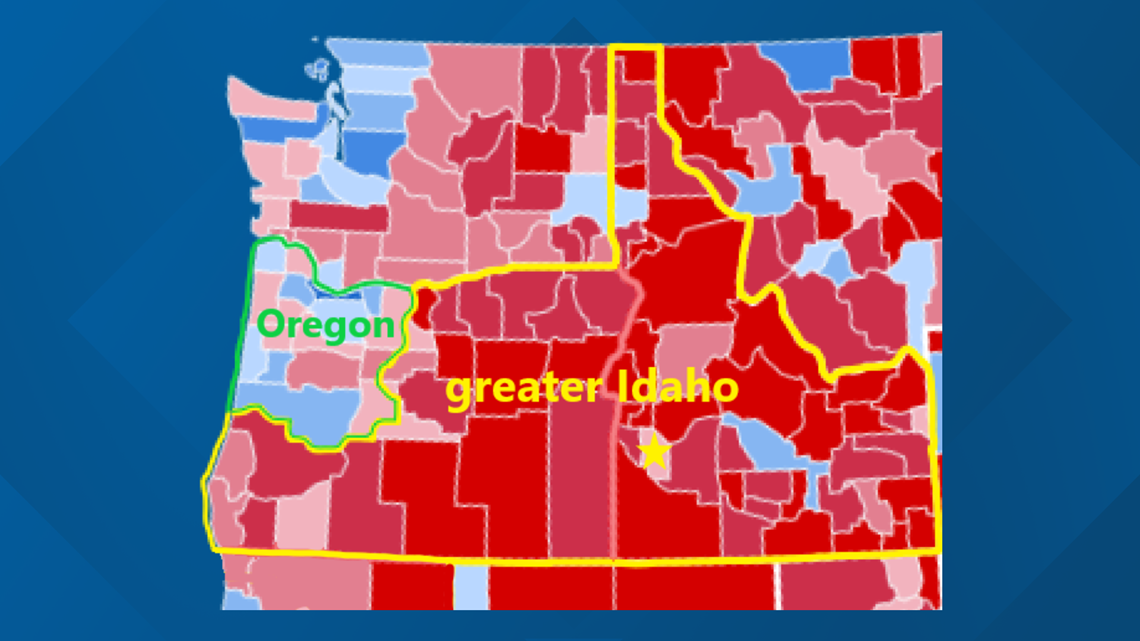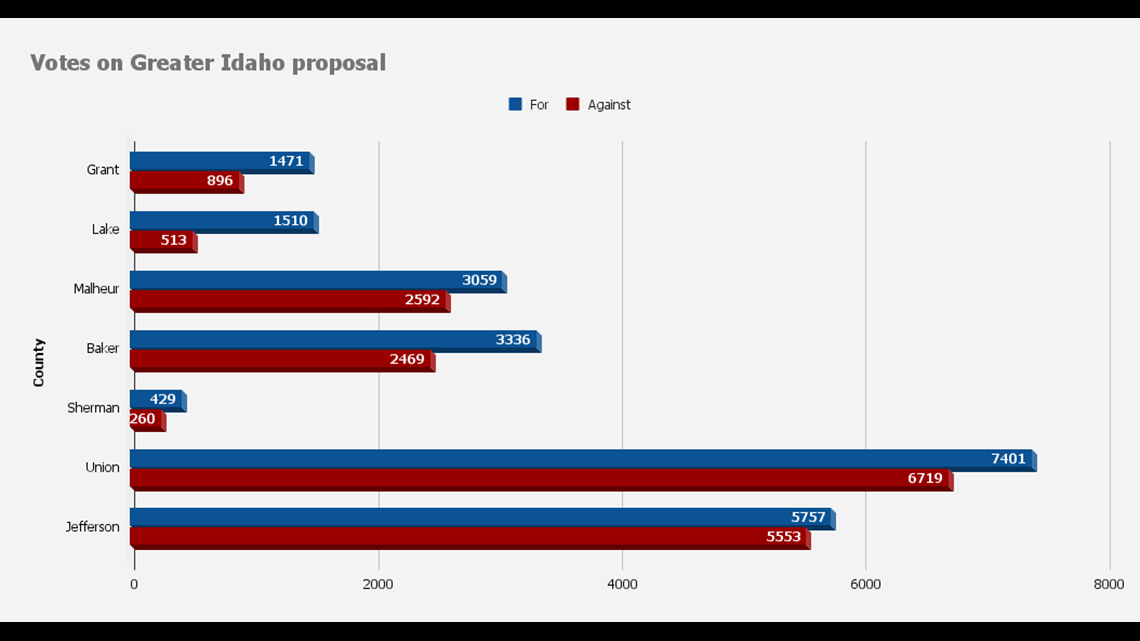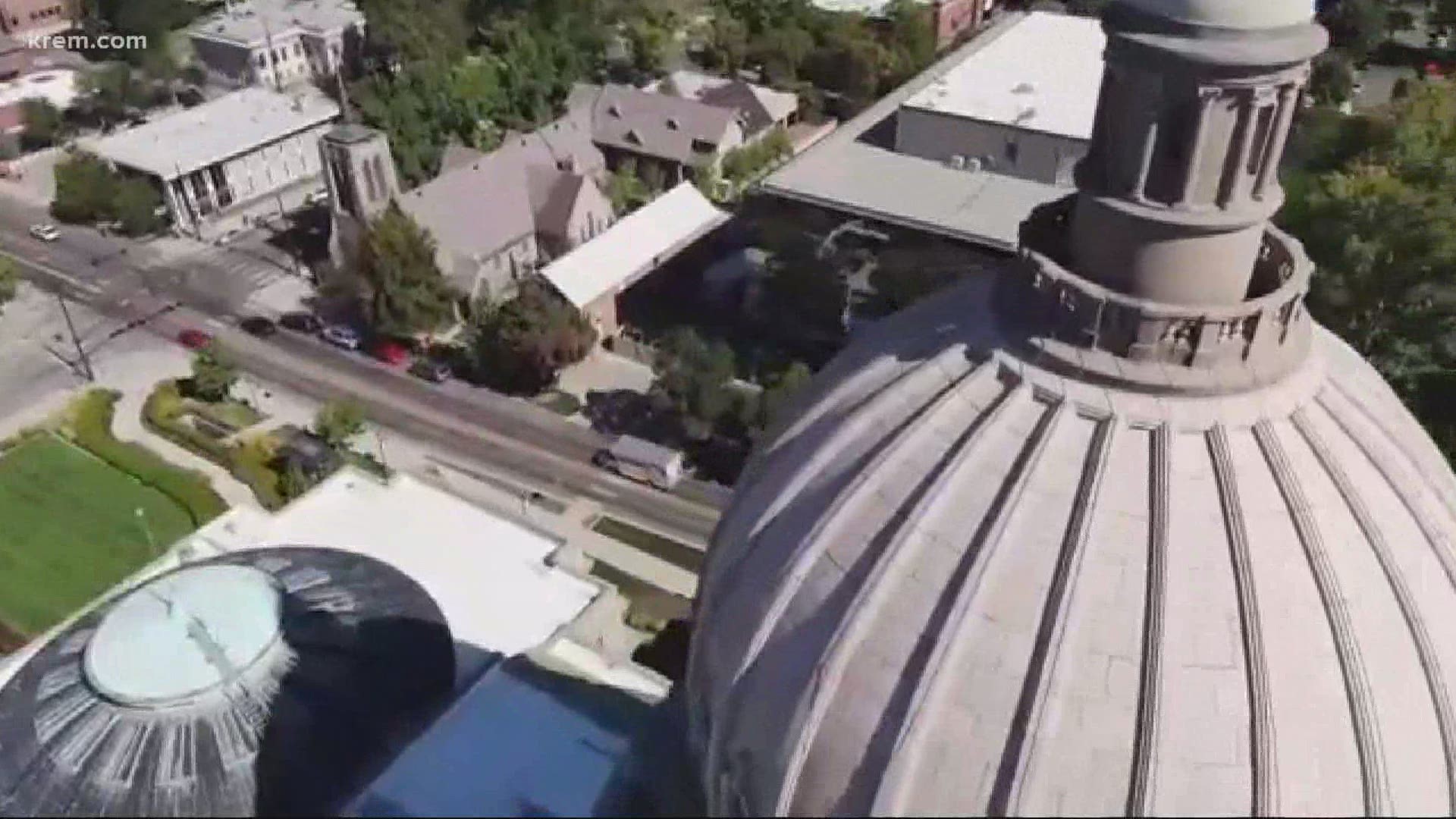SALEM, Ore. — Seven rural counties in Oregon want to secede from their own state and join Idaho.
Keaton Ems grew up on a farm in rural Oregon. He, along with 33% of the state's population, lives on more than 80% of the state's land, according to a study by Oregon State University. Over the years, he claims the state's progressive government has left Republicans out of decisions that impact them.
"They call us MAGA Land, they call us, 'make Idaho worser' people," spokesperson for Citizens for Greater Idaho Ems said. "If they don't want us, they don't want to listen to us, they don't have to have us."
The political divide is the root of the many reasons why seven rural counties want to leave. The counties that voted for the proposal are Baker, Grant, Jefferson, Lake, Malheur, Sherman and Union.
The Citizens of Greater Idaho and the Move Oregon's Borders organization are proposing the redrawing of state lines. Ems said Idaho aligns with his group's beliefs and practices more than the democrat-led Oregon.
"We don't have much in common with Portland," he said. "Unfortunately, their sheer numbers dominate the political scene and it just doesn't do well for the rest of us."
Issues of concern range from struggling with green energy laws due to lack of technology for farmers, intense building permits and the amount the state is involved in citizens' lives. Another reason Ems cites is because of feeling excluded.


"They call us racist or white supremacist," he said. "I'll always judge people on their character and not on the color of their skin."
Their brochures include other reasons such as Oregon having "driver's licenses for illegals," "men in girls' sports leagues" and "no arsonists or rioters set free."
Most left-leaning policies are off the table for the organization. Democrats have controlled the office of the governor, the state House and the state Senate for the past 13 years.
"I believe in a representative government, and going through the democratic channels of our Republic is a beautiful thing that we have in this country," he added. "Unfortunately, the bad sides of democracy where 51% can take away the rights of 49, that mob rule."
Oregon voted for President Joe Biden 56.4% in the 2020 general election; while 40.4% voted for incumbent Donald Trump. Ballot measures such as campaign finance limits, cigarette taxes, psilocybin ("magic mushrooms") legalization and drug decriminalization all passed with at least 10% but up to nearly 60% more of the vote.


"Our input isn't taken into account by people who live in a concrete jungle," he said. "It's just frustrating, we don't need to listen to four people screaming for every one of us."
Oregon GOP senators are frustrated, too. Oregon's lawmakers have been walking off the job a multitude of times over the past two years to oppose legislation pushed by Democrats, as reported by KGW, KREM 2's sister station in Portland.
"It's a completely different economy, demographics, culture; it's just a different speed of life than Portland," he added. "This whole movement of moving to Idaho [is because they have] a government geared towards, and more accustomed to, rural citizen needs."


If Ems' effort sounds familiar, it's because there's a similar effort to create a 51st state named, 'Liberty State' by splitting eastern Washington from its western half. Two Representatives to the State legislature out of Spokane Valley introduced a bill in mid-Jan. to create the 51st state.
Liberty State's western border would be along the "crest of the Cascade mountains and the western eight borders of Okanogan, Chelan, Kittitas, Yakima, and Klickitat counties," according to the bill. The eastern, northern and southern borders would remain the same.
The Liberty movement has faced criticism because of its ties to former State Representative Matt Shea, who has been linked to groups training young men for biblical warfare and the Malheur National Wildlife Refuge Armed Takeover in Oregon. Shea attempted to pass the bill in the State House for several years during his time as a representative. However, the bill has never received widespread support and is unlikely to pass in the Senate. Creating a new state is extremely difficult and hasn't been done in 150 years.
There's no way to track how many thousands of Oregonians are in the movement, because their Facebook pages and groups were banned. He said they were banned due to an attack on "conservative thoughts." Facebook claims it was "insurrectionist," and took it down on January 6th, he added.
When asked by KREM 2's Morgan Trau if anyone in his group stormed the Capital in the Jan. 6 attack, he scoffed.
"Storm? I don't know anybody who "stormed" the capital," he replied. "I saw people being led into the capital. Did we have grannies that were walking through the hallway waving a little flag in our group? Perhaps."
Dozens of suspected insurrectionists are using the defense that law enforcement officers let them in to the Capitol, so they didn't think there was anything wrong, according to an investigation released in late Feb. by ABC News. Some law experts told ABC that even if that happened, claiming ignorance is not an excuse for criminal behavior.
They have a new Facebook page, and make sure to tell their website viewers to add them on additional sites, like right-wing social media app Parler. Parler was banned from Apple's iOS App store and Google Play Store, for ties to the deadly Jan. 6 attack on the U.S. Capitol. The app is now back up, according to KREM 2's sister station WUSA 9 in Washington D.C.
"There's hope for a different set of representation," Ems said. "I feel like there is an opportunity to change from the supermajority. I think we're going to be able to shake things up a bit and find better representation, one way or another."
Changing Idaho and Oregon's borders would require approval from both states' legislatures and the U.S. Congress. Translation: it's extremely unlikely to happen. Ems believes his effort deserves a shot since he's not technically trying to create a new state.
"I think that's a fair compromise," he added. "The people in Portland don't want us. It's a peaceful divorce and these state lines are arbitrary anyway."
In their proposal, Greater Idaho suggests Idaho accepts Baker, Coos, Crook, Curry, Douglas, Gilliam, Grant, Harney, Jackson, Josephine, Klamath, Lake, Malheur, Morrow, Sherman, Umatilla, Union, Wallowa and Wheeler counties. Plus a portion of Wasco County that is east of the Deschutes River, the City of Maupin, all of Jefferson County except Deschutes National Forest and Warm Springs Indian Reservation, Terrebonne, Redmond, Alfalfa, southeastern Deschutes County, Three Rivers and La Pine. They don't stop there.
In California, they proposed counties of Siskiyou, Shasta, Tehama, Modoc and Lassen counties. Also, tiny portions of northern Butte, most of northern Plumas County, and "maybe" northwestern Sierra County.
But wait, there's more. In Washington, they propose Columbia, Garfield and Asotin counties. Also, Waitsburg and Uniontown.
Already, Oregon's Douglas and Wallowa counties voted against the movement.
KREM2 reached out to Oregon Gov. Kate Brown but have not heard back. In a statement, Gov. Little said, “There’s a lot that needs to happen before moving the border is within the realm of possibility.”
Read his full statement:
“I understand why many people want to be Idahoans. They’re looking at Idaho fondly because of our strong economy, regulatory atmosphere, and our values. Still, the decision to change Idaho and Oregon’s borders would need to go through both states’ legislatures and the U.S. Congress for approval. There’s a lot that needs to happen before moving the border is within the realm of possibility.”

